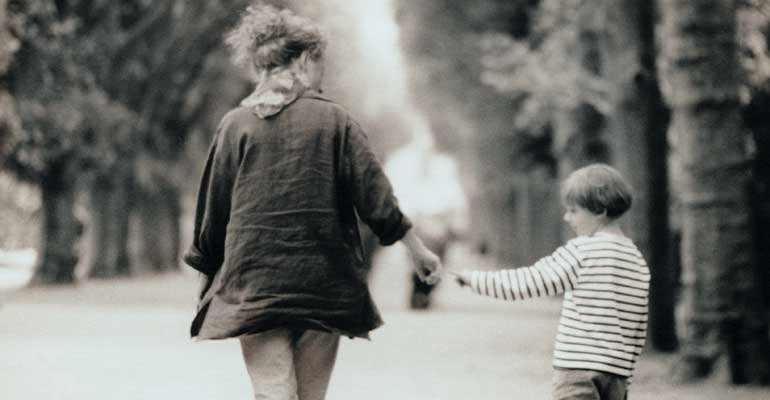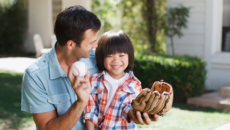One evening not long ago, my daughter, Emily, was doing her second-grade homework at the table. The first question was, “Do you have any brothers and sisters?”
She wrote, in that small, neat handwriting she’s been grooming, “None that I know of.”
We put her homework back in her folder, without mentioning the unusual response. Perhaps she was being cute; perhaps, honest. My wife and I talked about it that night and the next day, deciding we should ask Emily what she meant. But we didn’t.
It’s so easy not to talk about adoption with our children.
Two Sides to the Story
Every adoptive parent tells a story. Usually, it’s the happy adoption story — we needed a baby, you needed parents, and from the moment we saw you, we knew you were the one.
But there’s also another story, which we’re not always eager to tell. The one about the birth mother who relinquished you. The one about the feelings you had then, or the questions you have now, and maybe the mixed-up feelings you have trying to figure out how your love for your parents squares with your ideas about the ones who gave you life.
Last fall, an adoptive mother, writing to an e-mail discussion group, found herself wondering aloud whether all adoptive parents need to tell the sad story. Her name is Maggie Silverstein, and her daughters, now ages 5 and 7, are from China. But the issues she raised are nearly universal — whether with open adoption or not, domestic or international, shortly after birth or many years later.
“Are we obligated to show them all the maudlin literature about how sad their birth mothers are and will always be, and how sad our children should be because they will never know their birth mothers?” she asked.
For her, more casual discussions worked better. After reading the adoption classic Anne of Green Gables, her older daughter said she felt lucky to have been adopted as a baby, rather than as a 5-year-old girl.
Silverstein’s e-mail opened the floodgates. Dozens of heartfelt responses followed. Some agreed there was a sense of relief, of throwing off the cloak of political correctness.
But then other voices emerged, arguing that it’s easy to develop a conspiracy of silence over these emotional issues, that it’s easy to give our kids signals that we’d just as soon not discuss this stuff too much. Our children may feel like protecting us, some wrote, but that’s not a good place to put our kids.
It’s All OK
Should we tell our children sad stories? Happy stories? Perhaps these are the wrong questions. What may matter more is to open conversations, create opportunities to discuss what makes our families what they are, and allow our children to ask questions and be OK with whatever they feel.
“I don’t think parents should have an agenda about how their children feel about anything,” says Ronny Diamond, director of the Adoption Resource Center at Spence-Chapin in New York City. “It is their job to listen, to hear what’s there, and to help their children deal with it.”
“Listen to what your children are feeling, and be ready to hear that there may be pain. The message isn’t that there will be pain, but allow for that possibility. The range is huge, from adoption being no big deal to its being a very big deal.”
With this in mind, we need to remember that feelings are normal, and we shouldn’t be afraid to talk about them, says Debbie Riley, Executive Director of the Center for Adoption Support and Education in Silver Spring, Maryland.
“We can’t avoid the reality that our children have lost the option of being raised by their birth family. Whatever our children’s reaction, sometimes we just need to listen and be supportive.”
How that happens depends on the temperament of the child, and changes as he grows. It’s around age 7 that a child may really understand that, for him to be adopted, someone had to give him up. Around adolescence, questions may become more personal: “Why didn’t she want me?”
Just because kids don’t have many questions, doesn’t mean they’re not thinking about their origins. “What children are willing and able to share may be entirely different from the views their parents have,” says Jane Brown, M.S.W., whose Adoption Playshops have given thousands of kids a forum to express themselves. “Assume that your child does have feelings, whether or not she’s ready to reveal all of them.”
Our children are also sensitive to our feelings, suggests Amanda Baden, Ph.D., a counseling psychologist in New York City, who was adopted from Hong Kong 35 years ago.
“I often hear kids say things like, ‘Oh, my parents don’t like to talk about it,’ or, ‘They always try to talk about it.’” What is crucial for our kids to learn from us is that family does not mean biology; that we’ve made the commitment to be permanent; that we’ll be there for them, no matter what.”
Happy for Life?
Our children will always be children who were adopted, and their feelings are likely to be different at ages 4, 7, 10, 20, 30, and beyond. It may be as big a mistake to assume that they are troubled by their history as to assume that it’s of no import. Every child, at each age, is different.
“I was adopted as an infant almost 35 years ago, and I don’t remember having sad feelings about it,” says Susan Huston, of Eau Claire, Wisconsin. “I was always proud of being so wanted by my parents.”
She’s now the mom of two — a biological daughter, age 8, and a son, age 9 months, adopted from Korea. “When I was growing up, we didn’t talk about it that much. Every year we’d go to the Minnesota State Fair and pass the adoption agency, and my parents would say, ‘That’s where we got you.’ But I wasn’t defined by it.”
She did read every novel about adoption she could get her hands on as a teenager, and, at 28, as a new mom, she sought out her birth mother. “I wanted to know medical things, for me and my daughter. The curiosity was there. I remember the first time I could fill out a medical form and not say, ‘I don’t know — I was adopted.’ I think if kids didn’t wonder about being adopted, it would be strange. But I hope my son doesn’t obsess about it.”
Kathleen Tell, of Point Pleasant, New Jersey, is an adoptee who’s now an adoptive mom of two girls, ages 8 and 10. “It’s a mistake not to talk about it, and it’s a mistake to talk about it in a way that suggests there’s a problem that may not be there,” she says. “To me, adoption is a natural thing.”
As a child, her mother talked about her birth mother so much that she and her three siblings (also adopted) would roll their eyes. “My mom would say things like, ‘Your biological mother would be so proud of you.’ It was clear to me that my mother loved my first mother, even though they had never met.”
For her own kids, she sometimes feels she’s too cavalier about adoption, but at night, when the kids say their prayers, they “ask God to bless their Chinese parents and the people who took care of them there.”
Tell’s kids may wonder about being adopted more than she realized. Her daughter, Caroline, adopted at age 4, told me, “When you first meet your new parents, it’s weird because they’re not like you. Then it makes you sad because you don’t know what happened to your Chinese parents.”
Hearts Wide Open
If, as experts say, the issue is emotional openness rather than the right script, just about any approach that encourages questions may be fine. Like reading Anne of Green Gables, rather than “maudlin” stories.
“My older daughter, May, asked a difficult question the other day,” says Maggie Silverstein. “She said, ‘Well, you said you found me and love me so much, but would you have loved any baby?’”
Silverstein realizes intellectually that she would have loved any baby put into her arms, yet, she adds, “I can’t imagine life with any other children than the two babies we got. So I told her that we have come to believe that the babies we got were absolutely meant to be our children.”
Silverstein has found the e-mail exchange enlightening. “It was a good reminder for me to make sure that we’re being open and totally honest. It reminds me that we parents need to bring up the subject ourselves sometimes, and not just wait for something to generate it. It’s raised my consciousness. There’s a middle ground, and it depends on your children.”
Says Lois Melina, Adoptive Families columnist and author of Raising Adopted Children, “Those of us who’ve been advising adoptive parents to acknowledge the loss aren’t trying to get kids to feel pain they don’t feel, but to be open to whatever their response is. It’s not up to us to decide whether it’s sad or not. It’s up to us to be open to whatever it is for them. If our ears are open, we may find that our children are asking us about adoption, even if the words ‘adoption’ or ‘birth mother’ are never used by them.”
Like my daughter’s mentioning in a homework assignment that she has no brothers or sisters she knows of? “That’s precisely the kind of opportunity,” says Melina. “At 7 or 8, she’s exactly the age at which she might realize that she could have birth siblings.”
Homework
For this article, I told my daughter I wanted to interview her. But I waited until after all my other interviews were finished. I started by telling her about the family that read Anne of Green Gables together.
“I read it,” she says (in a children’s version). “There’s this girl and she was an orphan and she went to this house called Green Gables. And that’s the whole reason it’s called Anne of Green Gables!“ she says, laughing. “The man who picked Anne up had a wife who’s didn’t like Anne at first, but later in the story she started to like Anne more.”
“Did it make you think about being adopted yourself?”
“I didn’t really think about myself being adopted. I thought about how hard it is to go to different houses, to live like travelers, and how you have to not get too attached to each person.”
Does she ever think about adoption? “Sometimes I try to remember what China looks like. That’s the main thing. I imagine it — I’ve seen a few photographs — sort of like a city, and then there are farms and crops. I don’t really think of myself as a little baby back then. Sometimes I try to imagine the orphanage. I wonder about all these different places. Sometimes I think about a long time ago in China, when it was really poor there.”
I ask her about the comment about brothers and sisters. “Well, none that I know of. But maybe I did have brothers and sisters a long time ago. But none that I live with. I wonder about that. Sometimes I do.”


